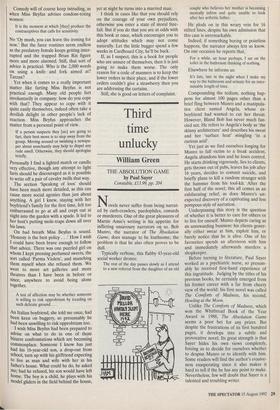Third time unlucky
William Green
THE ABSOLUTION GAME
by Paul Sayer Constable, £13.99, pp. 204 Novels never suffer from being narrat- ed by curb-crawlers, paedophiles, cowards or murderers. One of the great pleasures of Martin Amis's writing is his appetite for inflicting unsavoury narrators on us. Bob Munro, the narrator of The Absolution Game, does manage to be loathsome; the problem is that he also often proves to be dull.
Typically verbose, this flabby 43-year-old social worker drones:
The rest of the day passes slowly as I attend to a new referral from the daughter of an old couple who believes her mother is becoming mentally infirm and quite unable to look after her arthritic father.
He plods on in this weary vein for 16 stilted lines, despite his own admission that this case is unremarkable.
Indeed, if something boring or pointless happens, the narrator always lets us know. On one occasion he reports that,
For a while, an hour perhaps, I sat on the toilet in the bathroom thinking of nothing.
Elsewhere he informs us: It's late, late in the night when I make my way to the bathroom and urinate for an inter- minable length of time.
Compounding the tedium, nothing hap- pens for almost 100 pages other than a brief fling between Munro and a manipula- tive client named Angela, whose ex- boyfriend had wanted to cut her throat. However, Bland Bob has never much fan- cied sex. He refers to Angela's body as 'the skinny architecture' and describes his sweat and her 'surface heat' mingling 'in a curious acid'.
Yet just as we find ourselves longing for Munro to fall victim to a freak accident, Angela abandons him and he loses control. He starts drinking vigorously, lies to clients, gets thrown out of pubs, leaves his job after 16 years, decides to commit suicide, and briefly plans to kill a random stranger with the hammer from his tool-kit. After the first half of the novel, this all comes as an exhilarating relief, as does Munro's un- expected discovery of a captivating and less pompous style of narration. Underpinning this story is the question of whether it is better to care for others or to live for oneself. Munro depicts caring as an unrewarding business: his clients gener- ally either swear at him, exploit him, or barely notice that he is alive. One of his favourites spends an afternoon with him and immediately afterwards murders a shopkeeper. Before turning to literature, Paul Sayer worked as a psychiatric nurse, so presum- ably he received first-hand experience of this ingratitude. Judging by the titles of his previous books, he certainly emerged from his former career with a far from cheery view of the world: his first novel was called The Comforts of Madness, his second, Howling at the Moon.
Unlike The Comforts of Madness, which won the Whitbread Book of the Year Award in 1988, The Absolution Game seems a poor bet for any prizes. But despite the frustrations of its first hundred pages, it develops into a subtle and provocative novel. Its great strength is that Sayer hides his own views completely, forcing us to decide for ourselves whether to despise Munro or to identify with him. Some readers will find the author's evasive- ness exasperating since it also makes it hard to tell if the he has any point to make. Nevertheless, few will doubt that Sayer is a talented and troubling writer.


















































 Previous page
Previous page